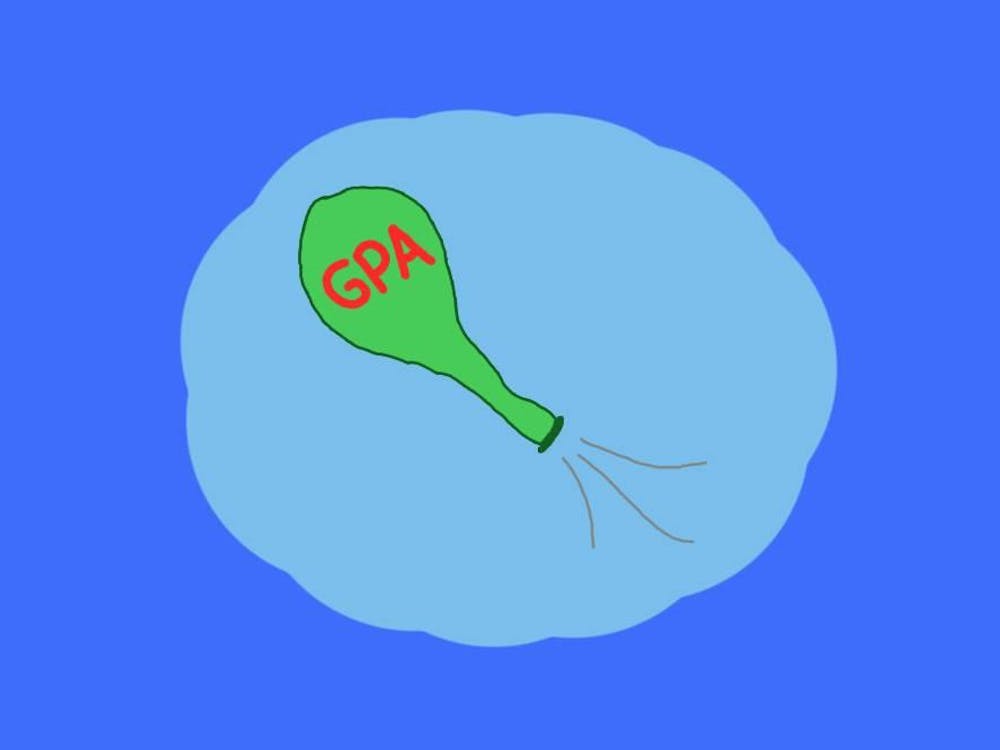I'M SORRY, the number you have reached is not a valid number. ... About the third time I got this message, I gave up on getting some answers and reached for my coat. I had no clue whether or not I had classes, but because I'm such a conscientious student and was worried about getting kicked off several class rosters with giant waiting lists, I strapped on my boots.
Sure, it was fun at first. Snowflakes tickled my eyelashes, and I marveled at the beauty of the Lawn. But then the winds came, and the snowflakes that had been coating my eyelashes were pelting my eyes - the Lawn disappeared in a flood of tears. I was happy to be inside, even if I did have to sit through classes.
But hark! A note on the door ... EVSC is CANCELLED today ... Oh joy of joys! Suddenly, I was a five-year-old on a snow day. I headed home for hot chocolate, and suddenly I didn't mind the wind.
My roommate was not so lucky. The paths were fairly clear up to the Engineering school, she said, but she and all the other psychology majors slipped and slid their way up to Gilmer Hall. One of her professors had e-mailed saying she was having class, but she didn't know about the other three.
Truth is, no one really knew. We may be one of the most "wired" campuses in the nation, but Tuesday we may as well have been living in the age of smoke signals. The radio stations would say nothing except that everything else in the world was closed - even the federal government shut down - but that U.Va. people should call 243- or 924-SNOW. Those two numbers were equally helpful, with busy signals and error messages. Not even the information gods hiding in my computer could help - the University Web site's Top News section had something to do with Scott Stadium.
Chief Financial Officer and snow decision-maker Leonard W. Sandridge told me in a personal interview that the two numbers got so many calls that they just shut down. He also insists that the information was posted on the Web, though he couldn't say when.
Funny how on snow days, "when" is a key issue. Sandridge said that he made the decision to hold classes at 5 a.m.; on Tuesday morning it didn't start snowing until 5:30. Mr. Sandridge said that he did consult with the state climatologist, and that his prediction that the snow would stop at noon was right on the money.
But what about the "when" after 5:30 a.m. and before noon? During that time, Charlottesville streets turned into long, slender parking lots. Z95 pleaded with its listeners not to go out on the road unless it was absolutely necessary, and far too many people tried to get to work anyway.
Sandridge made the excellent point that some things at the University have to go on, no matter what Mother Nature throws out. The dining halls have to feed students, the police department has to patrol, and the hospital has to keep its doors open.
But one missed day of classes would not risk a student's survival. In fact, on a day like Tuesday, it might do just the opposite.
Let's say Sandridge had canceled class until noon. Day workers who do nonessential work like shoveling the snow off walkways - and wouldn't have been involved in the massive traffic jam - would have had an easier time getting to work in the first place. The University could have waited until the snow had stopped to scrape the parking lots, instead of fighting the losing battle while it was still coming down.
Professors could have taken the day to work at home - losing one day of classes this early in the semester wouldn't have been a huge impediment because they still have so much time to make it up. Had this snow fallen during the last week of November, calling off class would have meant missing pre-exam reviews, interfering with final paper deadlines, and taking away precious moments from the last few classes' cram time.
Tuesday would have been the perfect time to give every possible person a little time off. We all need to act like 5-year-olds every once in a while, and I'm sure professors would have jumped at the opportunity to stay home with their families too. Every once in a while nature has a way of telling us to slow down and enjoy the wonders of the world. Here, that sign is snow - these hills were made for sledding and these buildings just beg to have their pictures taken when they are coated with white. Not to mention the fact that dorm snowball fights are much more valuable memories than one day of Virgil.
Lots did go right on Tuesday. Sandridge said that all parking garages were opened free of charge for those who had to drive in. No one seems to have been seriously hurt going to class, though I did feel sorry for some of the student athlete types I saw on crutches. Some professors did manage to e-mail their students and cancel class. But something in Sandridge's voice during our brief interview yesterday told me that he'd been getting a lot of phone calls - to say the least he sounded a little harried.
On a day like Tuesday, it all comes down to prompt communication. First, Mother Nature tells us to stay put, then our weather wizards on TV tell us how long we'll be staying put. Then our bosses tell us whether to ignore the weather and the weatherman. Their decision should be a practical one though, and it should have a little of the 5-year-old's excitement.
(Emily Harding's column appears Fridays in The Cavalier Daily.)




